- Home
- Sue Grafton
A Is for Alibi Page 9
A Is for Alibi Read online
Page 9
Grace looked at me then with those large, dark eyes. She had a good face, almost childlike, with a small nose, a sweet mouth. She took out a Kleenex and wiped her cheeks. “I don’t think I can talk about it anymore. Stay for lunch. Meet Lyle. Maybe he can tell you something that would help.”
10
I sat on a stool in the kitchen and watched Grace make tuna fish salad for lunch. She had seemed to shake herself, as though wakening from a brief but vital nap and then she had put on her apron and cleared the diningroom table of the rest of her sewing paraphernalia. She was a woman who worked with care, her movements restful as she assembled placemats and napkins. I set the table for her, feeling like a well-behaved kid again while she rinsed lettuce and patted it dry, placing a layer on each plate like a doilie. She neatly pared thin ribbons of skin from several tomatoes and coiled them like roses. She fluted a mushroom for each plate, added two thin spikes of asparagus so that the whole of it looked like a flower arrangement. She smiled at me timidly, taking pleasure in the picture she had created. “Do you cook?”
I shook my head.
“I don’t have much occasion to myself except when Lyle’s here. Raymond wouldn’t notice and I probably wouldn’t bother at all if it were just for me.” She lifted her head. “There.”
I hadn’t heard the truck pull into the driveway but she must have been tuned to Lyle’s arrival. Her hand strayed unconsciously to a strand of hair, which she tucked back. He came in through a utility room off to the left, pausing around the corner, apparently to take off his boots. I heard two thunks. “Hey, babe. What’s for lunch?”
He came around into the dining room with a grin, giving her cheek a noisy buss before he caught sight of me. He halted, the animation flickering off and on, then draining out of his face. He looked at her hesitantly.
“This is Miss Millhone,” she said to him.
“Kinsey,” I filled in, holding out my hand. He reached out and shook my hand automatically, but the central question still hadn’t been answered. I suspected that I was intruding on an occasion that ordinarily admitted no variation. “I’m a private investigator from Santa Teresa,” I said.
Lyle moved over to Raymond without another glance at me.
“Hey, Pops. How’s it going today? You feeling okay?”
The old man’s face registered nothing, but his eyes came into focus. Lyle took the headphones off, turning the set off too. The change in Lyle had been immediate and I felt as if I’d just seen snapshots of two different personalities in the same body, one joyful, the other keeping watch. He was not much taller than me and his body was trim, his shoulders wide. He had his shirt pulled out, unbuttoned down the front. His chest muscles were spare but well formed like those of a man who’s been lifting weights. I guessed him to be about my own age. His hair was blond, worn long and faintly tinted with the green of a chlorinated swimming pool and hot sun. His eyes were a washed-out blue, too pale for his tan, his lashes bleached, his chin too narrow for the breadth of his cheeks. The overall effect was of a face oddly off—good looks gone slightly askew, as though under the surface there were a hairline crack. Some subterranean tremor had caused the bones to shift minutely and the two halves of his face seemed not quite to match. He wore faded jeans slung low on his hips and I could see the silky line of darkish hair pointing like an arrow toward his crotch.
He went about his business, ignoring me completely, talking to Grace while he worked. She handed him a towel, which he tucked under Raymond’s chin, and then he proceeded to lather and shave him with a safety razor, which he rinsed in a stainless-steel bowl. Grace was taking out bottles of beer, removing the caps, pouring liquid into tulip glasses which she set at each place. There was no plate prepared for Raymond at all. When the shaving process had been completed, Lyle brushed Raymond’s thinning white hair and then fed him a jar of baby food. Grace shot me a satisfied look. See what a dear he is? Lyle reminded me of an older brother caring for a toddler so that Mom would approve. She did. She looked on affectionately while Lyle scraped Raymond’s chin with the bowl of the spoon, easing the drooling vegetable puree back into Raymond’s slack mouth. Even as I watched, a stain began to spread across the front of Raymond’s pants.
“Hey, don’t worry about it, Pops,” Lyle crooned, “we’ll get you cleaned up after lunch. How’s that?”
I could feel the muscles in my face setting with distaste.
During lunch, Lyle ate quickly, saying nothing to me and very little to Grace.
“What sort of work do you do, Lyle?” I said.
“Lay brick.”
I looked at his hands. His fingers were long and dusted with mortar gray that had seeped down into the crevices of his skin. At this range, I could smell sweat, overlaid with the delicate scent of dope. I wondered if Grace noticed at all or if, perhaps, she thought it might be some exotic aftershave.
“I’ve got to make a run up to Vegas,” I said to Grace, “but I’d like to stop back on my way up to Santa Teresa. Do you have any of Libby’s belongings?” I was relatively certain she did.
Grace consulted Lyle with a quick look but his eyes were lowered to his plate. “I believe so. There are some boxes in the basement, aren’t there, Lyle? Elizabeth’s books and papers?”
The old man made a sound at the mention of her name and Lyle wiped his mouth, tossing the napkin down as he got up. He wheeled Raymond down the hallway.
“I’m sorry. I shouldn’t have mentioned Libby,” I said.
“Well that’s all right,” she said. “If you’ll call or come by when you get back to Los Angeles, I’m sure it’d be all right if you looked at Elizabeth’s belongings. There isn’t much.”
“Lyle doesn’t seem to be in a very good mood,” I remarked. “I hope he doesn’t think I’m intruding.”
“Oh no. He’s quiet around people he doesn’t know,” she said. “I don’t know what I’d do without him. Raymond is too heavy for me to lift. I have a neighbor who stops by twice a day to help me get him in and out of his chair. His spine was crushed in the accident.”
Her conversational tone gave me the willies. “Do you mind if I use the bathroom?” I said.
“It’s down the hall. The second door on the right.”
As I passed the bedroom, I could see that Lyle had already lifted Raymond into bed. There were two straight-backed wooden chairs pushed up against the side of the double bed to keep him from falling out. Lyle was standing between the two chairs, cleaning Raymond’s bare ass. I went into the bathroom and closed the door.
I helped Grace clear the table and then I left, waiting in my car across the street. I made no attempt to conceal myself and no pretense at driving away. I could see Lyle’s pickup truck still parked in the driveway. I checked my watch. It was ten minutes to one and I figured he must be on a limited lunch hour. Sure enough, the side door opened and Lyle stepped out onto the narrow porch, pausing to lace his boots. He glanced over at the street, spotting my car, and seemed to smile to himself. Ass, I thought. He got into his truck and backed out of the driveway rapidly. I wondered for a moment if he intended to back straight across the street and into the side of my car, crushing me. He wheeled at the last minute, though, and flung the truck into gear, taking off with a chirp of rubber. I thought maybe we were going to have a little impromptu car chase but it turned out he didn’t have that far to go. He drove eight blocks and then pulled into the driveway of a modest-sized Sherman Oaks house that was being refaced with red brick. I guessed it was a status symbol of some sort because brick is very expensive on the West Coast. There probably aren’t six brick houses in the whole city of L.A.
He got out of his truck and ambled around to the back, tucking in his shirt, his manner insolent. I parked on the street and locked my car, following him. I wondered idly if he intended to smash my head in with a brick and then mortar me into a wall. He was not pleased with my arrival on the scene and he made no bones about that. As I rounded the corner, I could see that the owner of the house was disguising his litt
le cottage with a whole new facade. Instead of looking like a modest California bungalow, it would look like certain pet hospitals in the Midwest, real high-rent stuff. Lyle was already mixing up mortar in a wheelbarrow in the back. I picked my way across some two-by-fours with crooked rusty nails protruding. A little kid would have to have a lot of tetanus shots after falling on those.
“Why don’t we start all over again, Lyle,” I said conversationally.
He snorted, taking out a cigarette, which he tucked into the corner of his mouth. He lit it, cupping crusty hands around the match, and then blew out the first mouthful of smoke. His eyes were small and one of them squinted now as the smoke curled up across his face. He reminded me of early photographs of James Dean—that defensive hunched stance, the crooked smile, the pointed chin. I wondered if he was a secret admirer of East of Eden reruns, staying up late at night to watch on obscure channels piped in from Bakersfield.
“Hey, come on. Why don’t you talk to me,” I said.
“I don’t have nothin’ to say to you. Why stir up all that shit again?”
“Aren’t you interested in who killed Libby?”
He took his time about answering. He picked up a brick, holding it upright while he applied a thick layer of mortar to one end with a trowel, beveling the soft cement as if it were a gritty gray cheese. He laid the brick on the chest-high line of bricks where he’d been working and gave it a few taps with a hammer, bending down then to pick up the next brick.
I cupped my right hand to my ear. “Hello?” I said, as if I might have gone temporarily deaf.
He smirked, cigarette bobbing in his mouth. “You think you’re real hot shit, don’t you?”
I smiled. “Listen, Lyle. There’s no point in this. You don’t have to tell me anything and you know what I can do? Spend about an hour and a half this afternoon finding out anything I want to know about you. I can do it in six phone calls from a motel room in West Los Angeles and I’ve even got someone paying me for my time, so it’s nothing to me. It’s fun, if you really want to know the truth. I can get your service records, credit rating. I can find out if you’ve ever been arrested for anything, job history, library books overdue . . .”
“Go right ahead. I got nothin’ to hide.”
“Why put us through all that stuff?” I said. “I mean, I can go check you out but I’ll just come back around here tomorrow and if you don’t like me now, you ain’t gonna like me any better then. I might be in a bad mood. Why don’t you just loosen up?”
“Aw, I’m real loose,” he said.
“What happened to your plans to go to law school?”
“I dropped out,” he said sullenly.
“Maybe the dope smoking got to you,” I suggested mildly.
“Maybe you can go get fucked,” he snapped. “Do I look like a lawyer to you? I lost interest, okay? That’s no fuckin’ crime.”
“I’m not accusing you of anything. I just want to figure out what happened to Libby.”
He flipped the ash off the cigarette and dropped it, chunking it into the dirt with the toe of his boot. I sat down on a pile of bricks that had been covered with a tarp. Lyle glanced over at me through lowered lids.
“What makes you think I smoke dope anyway?” he asked abruptly.
I tapped my nose, letting him know I’d smelled it on him. “Also laying brick doesn’t seem that interesting,” I said. “I figure if you’re smart, you gotta do something to keep from going nuts.”
He looked at me, his body relaxing just a little bit. “What makes you think I’m smart?”
I shrugged. “You went with Libby Glass for ten years.”
He thought about that for a while.
“I don’t know anything,” he said, almost gruffly.
“You know more than I do at this point.”
He was beginning to relent, though his shoulders were still tense. He shook his head, going back to his work. He took the trowel and moved the damp mass of mortar around like cake icing that has gone all granular. “She dumped me after she met that guy from up north. That attorney . . .”
“Laurence Fife?”
“Yeah, I guess it was. She wouldn’t tell me anything about him. At first, it was business—something about some accounts. His law firm had just hooked up with the place she worked and she had to get all this stuff on the computer, you know? Set up to run smoothly from month to month. It was all real complicated, calls goin’ back and forth, things like that. He came down a few times and she’d have drinks when they finished up, sometimes dinner. She fell in love. That’s all I know.”
He took out a small metal brace at right angles and hammered it into the wooden siding on the house, placing a mortar-laden brick on top.
“What’s that do?” I asked out of curiosity.
“What? Oh. That keeps the brick wall from falling away from the rest,” he said.
I nodded, halfway tempted to try laying brick myself. “And she broke up with you after that?” I asked, getting back to the point.
“Pretty much. I’d see her now and again, but it was over and I knew it.”
He was beginning to drop the tension in his tone and he sounded more resigned than angry. Lyle buttered another brick with soft mortar and set it in place. The sun felt good on my back and I settled on my elbows, leaning back on the tarp.
“What’s your theory?” I asked.
He looked at me slyly. “Maybe she killed herself.”
“Suicide?” The thought hadn’t even crossed my mind.
“You asked. I’m just tellin’ you what I thought at the time. She sure was hung up on him.”
“Yeah, but enough to kill herself when he died?”
“Who knows?” He lifted one shoulder and let it drop.
“How did she find out about his death?”
“Someone called her and told her about it.”
“How do you know that?”
“Because she called me up. At first she didn’t know what to make of it.”
“She was grieving for him? Tears? Shock?”
He seemed to think back. “She was just real confused and upset. I went over there. She asked me to come and then she changed her mind and said she didn’t want to talk about it. She was shaky, couldn’t concentrate. It kind of made me mad that she was jerking me around, so I left. Next thing I knew, she was dead.”
“Who found her?”
“The apartment manager where she lived. She didn’t show up for work for two days and didn’t call in, so her boss got worried and went over to her place. The manager tried peeping in the windows but the drapes were shut. They knocked some, front and back, and finally got in with a passkey. She was lying on the bathroom floor in her robe. She’d been dead for three days.”
“What about her bed? Had it been slept in?”
“I don’t know. The police didn’t give that out.”
I thought about that for a minute. It sounded like she might have taken a capsule at night, just as Laurence Fife had. It still seemed to me it might have been the same medication—some kind of antihistamine capsule in which someone had substituted oleander.
“Did she have allergies, Lyle? Was she complaining of a head cold or anything like that when you saw her last?”
He shrugged. “She might have, I guess. I don’t remember anything like that. I saw her Thursday night. Wednesday or Thursday of that week when she heard that attorney was dead. She died on Saturday night late, they said. That much they put in the paper when it happened.”
“What about this attorney she was involved with? Do you know if he kept anything at her place? Toothbrush? Razor? Things like that? Maybe she took medication that was meant for him.”
“How do I know?” he said testily. “I don’t stick my nose where it doesn’t belong.”
“Did she have a girl friend? Someone she might have confided in?”
“Maybe from work. I don’t remember anyone in particular. She didn’t have ‘girl friends.’ ”
I took ou
t my notebook and jotted down the telephone number at my motel. “This is where I can be reached. Will you give me a call if you think of anything else?”
He took the slip of paper and tucked it carelessly into the back pocket of his jeans. “What’s in Las Vegas?” he asked. “How does that tie in?”
“I don’t know yet. There may be a woman down there who can fill in some blanks. I’ll be back through Los Angeles toward the end of the week. Maybe I’ll look you up again.”
Lyle had already tuned me out, tapping the next brick into place, troweling away the excess mortar that had drooled out between the cracks. I glanced at my watch. I still had time to check out the place where Libby Glass had worked. I didn’t think Lyle was telling the whole truth, but I had no way to be sure. So I let it slide—for the time being anyway.
11
Haycraft and McNiece was located in the Avco Embassy building in Westwood, not far from my motel. I parked in an expensive lot adjacent to the Westwood Village Mortuary and went into the entranceway near the Wells Fargo Bank, taking the elevator up. The office itself was just to the right as I got off. I pushed through a solid teak door, lettered in brass. The interior was done with polished uneven red-tile flooring, mirrors floor to ceiling, and panels of raw gray wood, hung here and there with clusters of dried corn. A receptionist sat behind a corral to my left. A placard reading “Allison, Receptionist” sat on the corral post, the letters burned into the wood as though by some charred stick. I gave her my card.
“I wonder if I might talk to a senior accountant,” I said. “I’m looking into the murder of a CPA who used to work here.”
“Oh yeah. I heard about her,” Allison said. “Hang on.”
She was in her twenties with long dark hair. She wore jeans and a string tie, her western-cut shirt looking like it had been stuffed with many handfuls of hay. Her belt buckle was shaped like a bucking mustang.
“What is this? A theme park or something?” I asked.
“Huh?”
I shook my head, not willing to pursue the point, and she clopped away in her high-heeled boots through some swinging doors. After a moment, she returned.

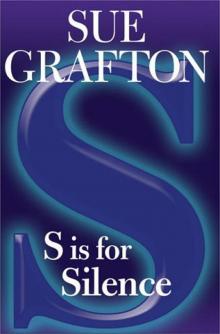 S Is for Silence
S Is for Silence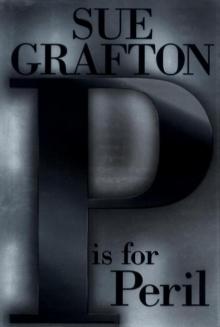 P Is for Peril
P Is for Peril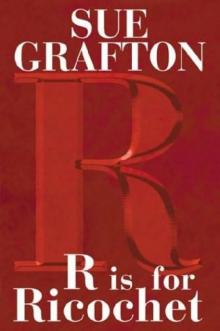 R Is for Ricochet
R Is for Ricochet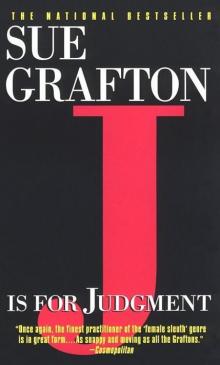 J Is for Judgment
J Is for Judgment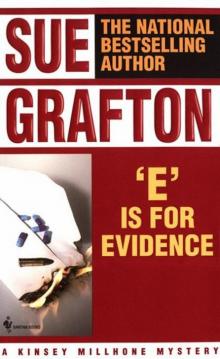 E Is for Evidence
E Is for Evidence T Is for Trespass
T Is for Trespass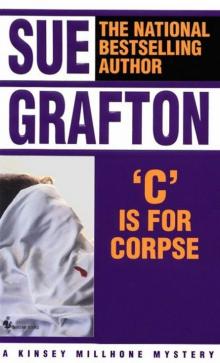 C Is for Corpse
C Is for Corpse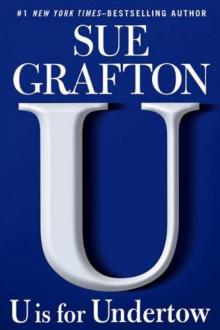 U Is for Undertow
U Is for Undertow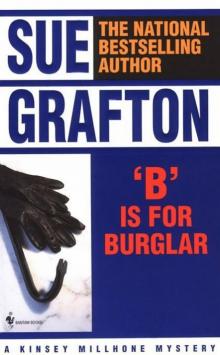 B Is for Burglar
B Is for Burglar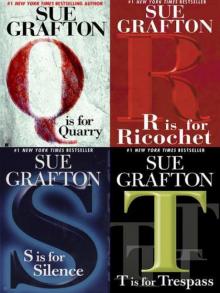 Four Sue Grafton Novels
Four Sue Grafton Novels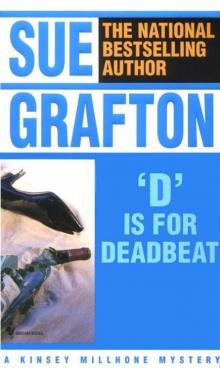 D Is for Deadbeat
D Is for Deadbeat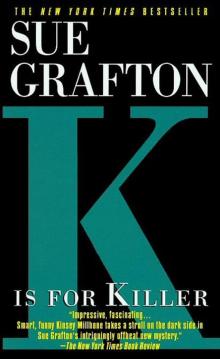 K Is for Killer
K Is for Killer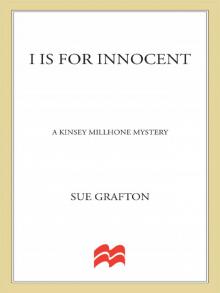 I Is for Innocent
I Is for Innocent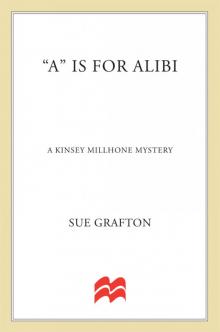 A Is for Alibi
A Is for Alibi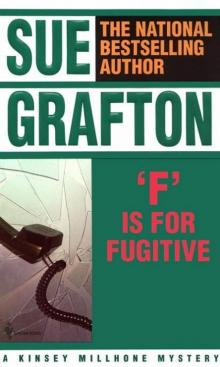 F Is for Fugitive
F Is for Fugitive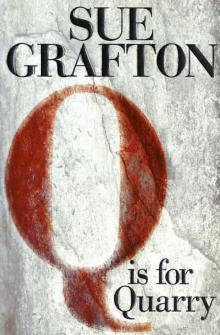 Q Is for Quarry
Q Is for Quarry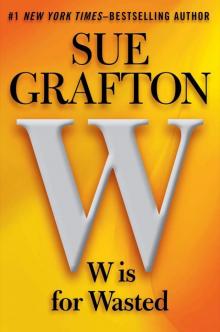 W Is for Wasted
W Is for Wasted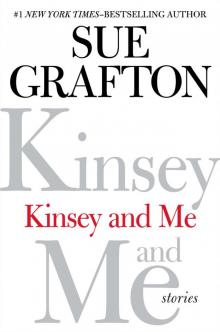 Kinsey and Me: Stories
Kinsey and Me: Stories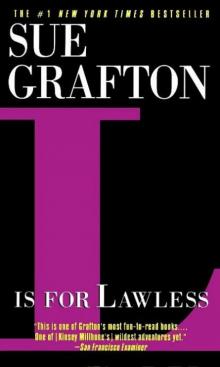 L Is for Lawless
L Is for Lawless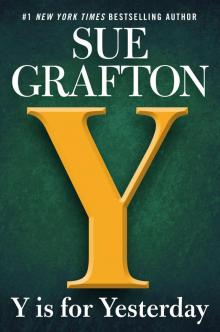 Y Is for Yesterday
Y Is for Yesterday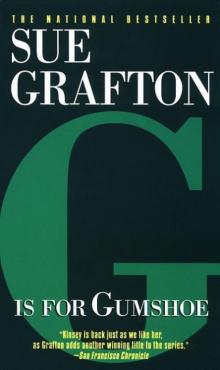 G Is for Gumshoe
G Is for Gumshoe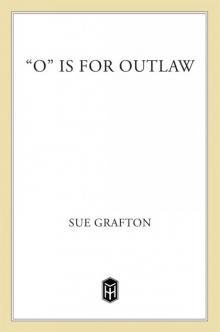 O Is for Outlaw
O Is for Outlaw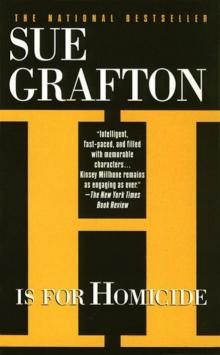 H Is for Homicide
H Is for Homicide X
X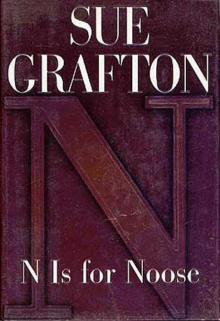 N Is for Noose
N Is for Noose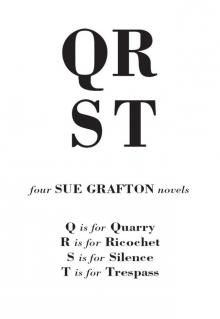 Three Complete Novels: A Is for Alibi / B Is for Burglar / C Is for Corpse
Three Complete Novels: A Is for Alibi / B Is for Burglar / C Is for Corpse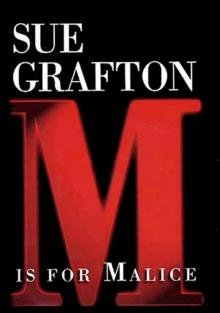 M Is for Malice
M Is for Malice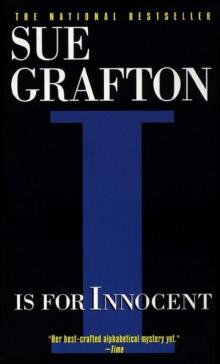 I is for INNOCENT
I is for INNOCENT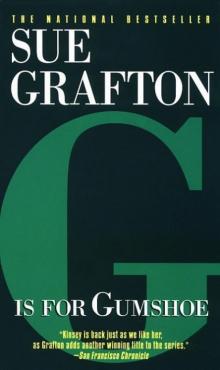 G is for GUMSHOE
G is for GUMSHOE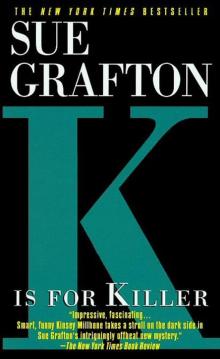 K is for KILLER
K is for KILLER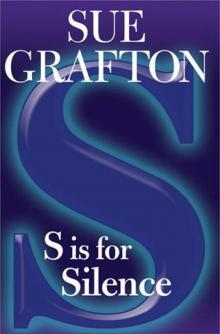 S is for SILENCE
S is for SILENCE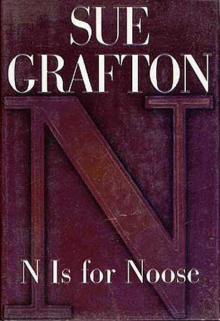 N is for NOOSE
N is for NOOSE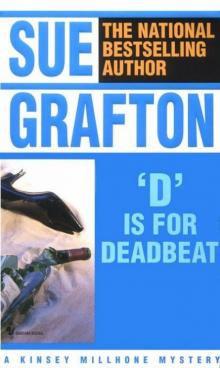 D is for DEADBEAT
D is for DEADBEAT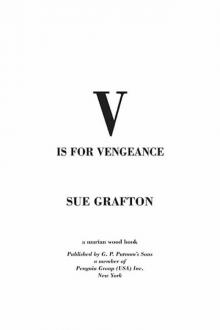 V is for Vengeance
V is for Vengeance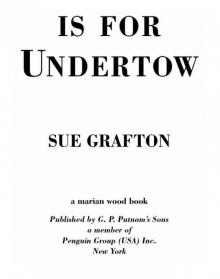 U is for Undertow
U is for Undertow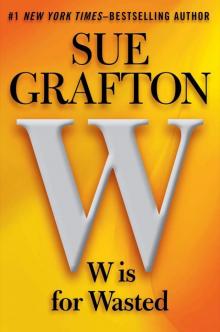 W Is for Wasted km-23
W Is for Wasted km-23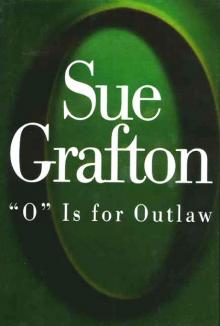 O is for OUTLAW
O is for OUTLAW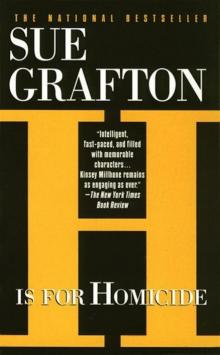 H is for HOMICIDE
H is for HOMICIDE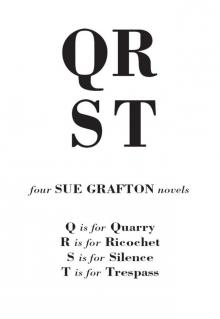 Sue Grafton Novel Collection
Sue Grafton Novel Collection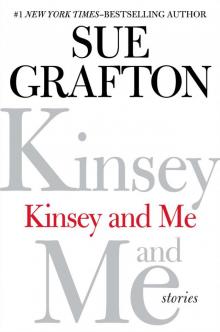 Kinsey and Me
Kinsey and Me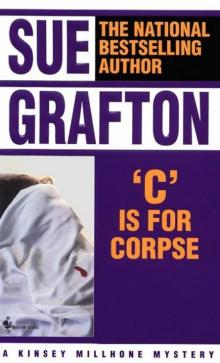 C is for CORPSE
C is for CORPSE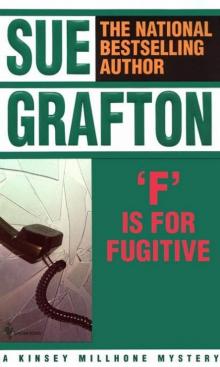 F is for FUGITIVE
F is for FUGITIVE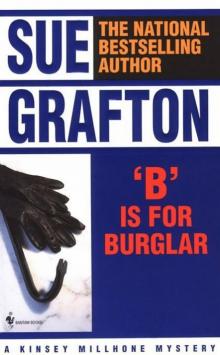 B is for BURGLAR
B is for BURGLAR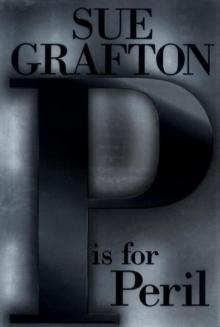 P is for PERIL
P is for PERIL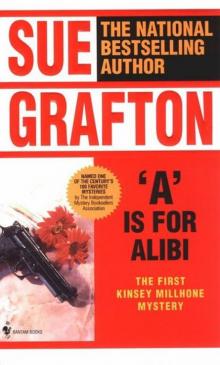 A is for ALIBI
A is for ALIBI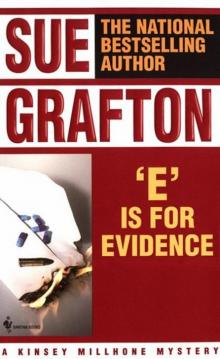 E is for EVIDENCE
E is for EVIDENCE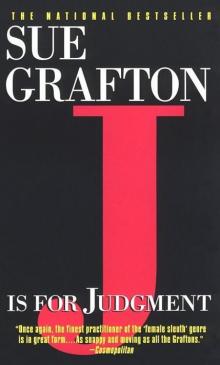 J is for JUDGMENT
J is for JUDGMENT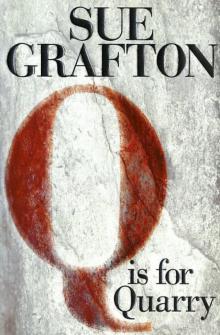 Q is for QUARRY
Q is for QUARRY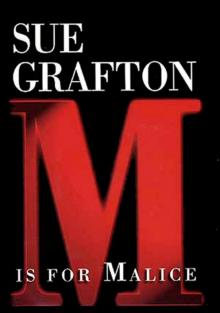 M is for MALICE
M is for MALICE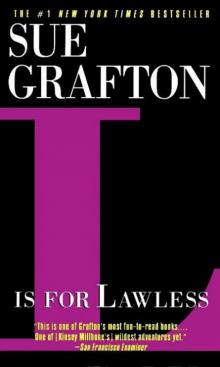 L is for LAWLESS
L is for LAWLESS